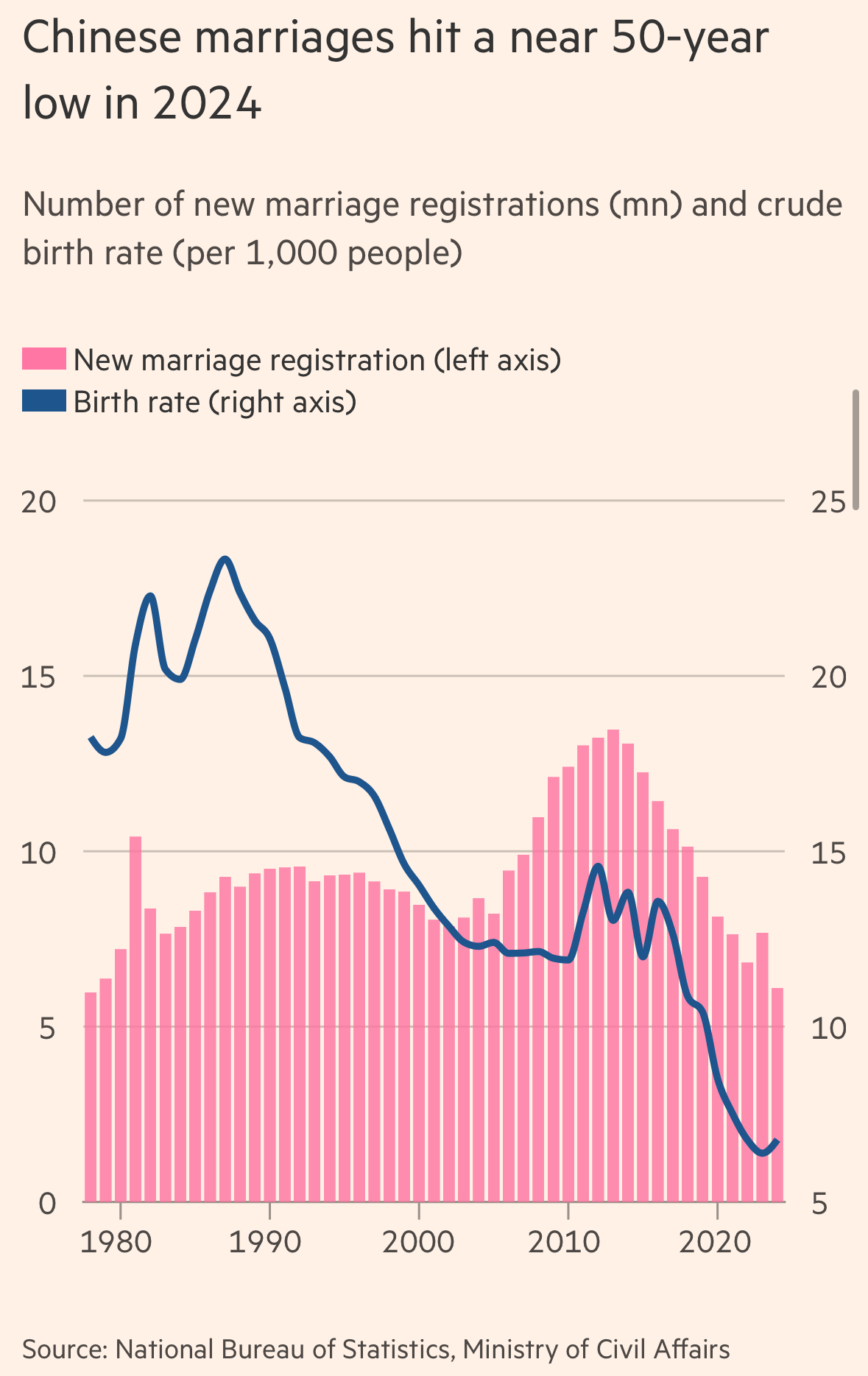Why are Chinese Marriages Plummeting?
China’s marriages have hit rock bottom - only 6.1 million weddings in 2024. This has massive economic consequences - fewer marriages mean mean fewer births, an ageing population, with declining labour productivity, and a rising dependency burden.
Bloomberg blames marital collapse on economic hardship. But my interviews with Chinese young people suggest three further drivers.
Cultural liberalisation means singledom is more permissible, while status is tied to economic success;
Online connectivity enables young women to celebrate independence & equality;
Men and women seem to be retreating into digital worlds.
This isn’t just about empty pockets - it echoes a global pattern of shifting aspirations and the rise of solitude.
Let’s dig in to the data on what’s driving China's demographic crisis.
By 2020, only 67% of Chinese women were married
Chen, Xiong and Tang decompose the collapse in fertility. They claim that 90% of fertility decline came simply from women marrying later or not at all.
In 1990, 80% of Chinese women under 50 were married. Typically, they married at around age 21-23. By 2020, this pattern had dramatically shifted right and flattened out. By 2020, only 67% were married.
However, on another point I am sceptical. Chen and colleagues say that in 2020, the total marital fertility rate (the number of births per married woman) jumped to *3*. That is high, inconsistent with other data, and seems to be driving their results on falling marriage being a primary driver of falling fertility. I welcome clarifications.
That aside, the decline in marriage is very real. So what’s going on??
Methods!
So what are my methods?
Well, I read (almost) everything and make amazing friendships with wonderful people from all over the world, constantly learning from their erudite observations and warm generosity. Frankly, I love meeting new people, learning about their lives and perspectives!
Thanks to the mighty powers of Microsoft Translate (shout out to the fabulous team in Hyderabad), many spoke in Mandarin while I replied in English. Chatting on Zoom, I have talked to people from cities across China.
I have the great fortune of teaching Chinese postgraduate students in London, and it’s definitely a two-way street. Over in Toronto, I also interviewed lots of young Chinese migrants. And for several weeks, I stayed at the Chinese University of Hong Kong. Campus cafes and canteens make for great conversation with students from the mainland, plus the view is magnificent.
Yes. I am very very lucky.
What Explains China’s Rise in Singles?
Let me share my very brief history of China’s cultural evolution.
For centuries, Chinese families secured trusted social networks by socialising their daughters to marry, obey and stay put. Chastity, self-sacrifice, obedience and filial piety were all cardinal values - celebrated in literature, folklore and art.
But these priorities were not absolute, they were weighed against competing desires for upward mobility. So when economic opportunities opened up, Shanghai’s young women flocked to bustling factories.
Having seized power, the CCP sought to mobilise female labour and maximise output. Radio propaganda and Sent Down Youths further encouraged female education and employment. As China industrialised, young women gained more opportunities to earn, remit money to their families, gain status and forge independent friendships.
East Asia’s tradition of exogamy (marrying outside one’s group) may have played an important role in this shift. Since families could make their own guanxi (relationships of reciprocity) with just about anyone, economic networks were not dependent on marrying your daughter to a tight-knit family group. Free to mix and mingle with diverse others, female seclusion was relatively weak. Daughters were despatched to urban factories.
Upward mobility is seriously glorified; it’s super important to get to the top. Status-conscious competitiveness generates hugely intensively schooling. The overwhelming focus is on working hard, excelling in education, getting a good job and earning money. Hong Kong’s Lunar New Year festivals and markets emphasises what really matters: ‘luck and money’.
With strong support for female employment and inadequate pensions, parents raise their daughters for economic independence.
“It’s important to make our parents proud” - reiterated Mei Lien and Jieyi from Guangzhou, as we chatted over a long lunch of Malatang.
“How do you do that?” - I asked.
“By going to a good college.. and getting a good job”
“What about getting a good husband?”
“Yes, but that’s not so important. My parents want me to be economically independent”
“A husband will respect and treat a woman better if she’s economically independent”.
Lele Zhao suggests this may have been exacerbated by reforms in the divorce law, which gave marital property to its original owner and increased women’s vulnerability.
60% of young women are currently enrolled in college. A further 60% of women are in the labour force. This is the East Asian miracle (for women): from arranged patrilocal marriages to female independence.
But university isn’t inherently anti-marriage, so it’s insufficient to explain the marriage and fertility collapse. Moreover, the CCP has long tarred singles as ‘sheng nü’ (‘leftover women’). Why was public shaming largely ineffective? Clearly, we need to understand men and women’s preferences.
Online Celebrations of Female Independence
The rise of social media and online literature has given women new platforms to express and endorse egalitarian alternatives. Culturally, women are rewriting the script - raising expectations of equality and independence.
Women who’ve been to university, built careers, and enjoyed independence do not want to do all the low status, thankless domestic drudgery for Lunar New Year. Thanks to exogamy, cultural liberalisation and feminist posting, singlehood is no longer stigmatised, they’re free to be selective, only marrying for loving companionship. The bar is raised.
On “Xiaohongshu” (a social media app popular with women), some young women take the term ‘wanghong’ (meaning online celebrity) to raise the prestige of singledom, crafting sophisticated “living alone” vlogs, showcasing pretty apartments, fitness routines, and evening rituals. They embrace luxury markets and refined consumption. Collectively, they are breaking taboos of “leftover women” and giving prestige to newfound independence.
And brands are taking note - increasingly adopting the slogan “Live for yourself”.
Importantly, the appeal of this package must be understood in relative terms.
So what’s the alternative?
Charm Deficits?
Traditionally, marriage was vital for consolidating family networks, while emotional connection was secondary. In loveless marriages, men may disregard their wives’ happiness, expecting them to sacrifice and manage housework alone. As Ang (from Sichuan) observed,
“Sometimes we can't get enough support from men. Some females can't chase their dreams”
Chimeg (from Hebei) complained that out of a hundred guys, maybe 20 have ‘EQ’ (emotional intelligence), and even that is used for guanxi (networks of trust and loyalty, used primarily for politics and business). Jokingly, I suggested that the CCP could create classes in emotional intelligence, where school kids have fun and learn to charm. No no, she shook her head!
“But CCP is all boys, they do not think that they are wrong!”
Chimeg meant that since CCP is overwhelmingly male, they would not recognise any limitations in men’s capacity to charm.. Indeed, the state strategy has been to blame and shame ‘leftover women’ and urge them to procreate.
Online Personal Entertainment
Digital media can be hyper engaging - offering delights from video games to social media, to pornography. Our pocket-sized dopamine dispensers offer endless streams of stimulation, potentially displacing demand for socialising. Chimeg put it bluntly,
“The unprecedented development of social networks and entertainment has made young people less interested in finding a spouse”.
In 2024, China’s domestic video game sales reached $45 billion Mobile games make up 73% of the total, while PC games are only 21%. People are playing on their phones, alone.
China’s female-targeted game market has also surged, with fans clamouring for the role-playing romance “Love and Deepspace”. Chimeg continued:
“In the game, you can fall in love with five super handsome guys from a first-person perspective, and even ask them to accompany you while you work out and study”.
These AI guys are totally devoted! In the battle mode, the man will provide automatic assistance. Qi Yu interjects to say, “Come back quickly” and “Be careful, does it hurt?”. Gamers can even touch on-screen characters and observe their reactions.
This leads me to a broader realisation… Labour market economists have been fixated on Generative AI’s intelligence - whether it will displace market demand for human labour, or turbo-charge a new era of productivity-growth. But what about something more fundamental: is online entertainment (video games, online gambling, podcast bros, TikTok) out-competing real-world connections?
Do online portals enable us to find something more charismatic, sexy, funny, and hyper-engaging? Is real life Qi Yu being left behind?
Do Men want Marriage and Kids?
Back in June 2023, I said something a little provocative:
“Right and Left both assume that men would love to have more kids, but fertility is being dragged down by women”. This is not necessarily true! “In rich, liberal countries, men and women enjoy a broad spectrum of activities for entertainment and status… Given widespread individualism and liberal tolerance, you are now free to do as you please”.
This is increasingly true of China! Its culture of exogamy (marrying outside extended kin) means that kin-based policing is weak. People can do business with whomever they please, and in conjunction with structural transformation, this enables rapid cultural liberalisation.
Independently, Chimeg volunteered this same point, emphasising video games:
“But boys do not want to get marriage too, they do not want to take responsibility of family. They live alone, they have computer games, they spend by themselves. Totally, they think they have good lives. I think it’s popular on the app of men [i.e. Baidu Teiba]”.
In sum, structural transformation, cultural liberalisation, and women’s media have raised women’s expectations. Yet men are not necessarily measuring up. Meanwhile, both may be finding alternative pleasures online.
The CCP may have used centralised power and technological extraction to become a world-leader in electrical vehicles, but now faces serious economic crisis - unless it can nurture romantic love.
But is that possible?


















When I ask my male friends about marriage, I found that a lot of them are lack of the awareness to build a family. A lot answers are: I have not thought about it before. But the same age girls may have already been aware what women would suffer in marriage. Maybe some boys do not want to take too much responsibility. Just planning for themselves is enough tired.
This is an interesting area of discussion, and while the female viewpoints are important, I would like to hear more from Chinese men themselves, rather than having women say what the men are thinking. Is what Chimeg saying correct, or is that her perception of men? What is the men's perception of themselves?
I don't say this from a place of ignorance. I speak to a lot more Chinese women than men - my own wife passed last year, and I inherited a lot of her female friendships, so I hear a lot about what they think of coupling and marriage, but I am underexposed to what the Chinese men are thinking.